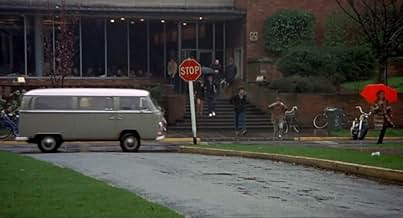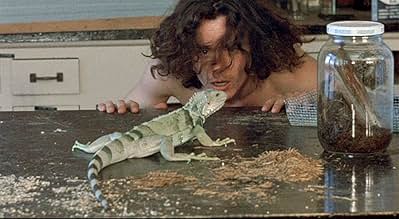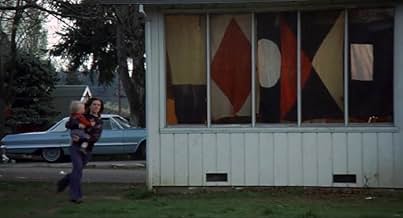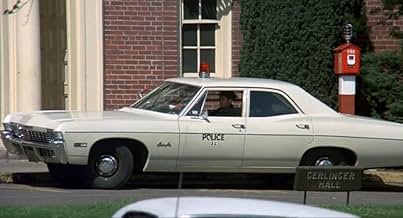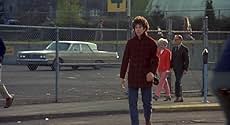AVALIAÇÃO DA IMDb
5,7/10
1,9 mil
SUA AVALIAÇÃO
O jogador estrela de um time de basquete universitário começa a sair dos trilhos com um caso de amor ilícito e seu colega de quarto enlouquece para evitar o recrutamento para a guerra.O jogador estrela de um time de basquete universitário começa a sair dos trilhos com um caso de amor ilícito e seu colega de quarto enlouquece para evitar o recrutamento para a guerra.O jogador estrela de um time de basquete universitário começa a sair dos trilhos com um caso de amor ilícito e seu colega de quarto enlouquece para evitar o recrutamento para a guerra.
- Direção
- Roteiristas
- Artistas
- Prêmios
- 1 vitória e 1 indicação no total
Michael Warren
- Easly
- (as Mike Warren)
Lynette Bernay
- Dance Instructor
- (as Lynn Bernay)
Joseph Walsh
- Announcer #1
- (as Joey Walsh)
David Ogden Stiers
- Pro Owner
- (as David Stiers)
Mireille Machu
- Secretary
- (as I.J. Jefferson)
Avaliações em destaque
One of the more unusual movies I've ever seen is "Drive, He Said." Made in 1971 made by the same production company that made "Easy Rider" and "Five Easy Pieces" that made Jack Nicholson a star a year or two earlier.
This was the first film directed by Jack Nicholson. It's a combination basketball, free love, anti-draft movie that was filmed on the campus of the University of Oregon. It was not well-received at the time, and was somewhat infamous for its male frontal nudity scenes. The basketball skill level seemed very high.
It's basically the story of two friends--one a basketball star and Greek major who's hormones are raging and is undecided about a pro career. The other is a guy taking drugs to try to stay out of the draft, and basically he flips out.
I thought it was an interesting premise, but I found the speech of the main characters to be stilted. In some ways it captured the ethos of U. S. campuses in the Vietnam War era pretty well.
This was the first film directed by Jack Nicholson. It's a combination basketball, free love, anti-draft movie that was filmed on the campus of the University of Oregon. It was not well-received at the time, and was somewhat infamous for its male frontal nudity scenes. The basketball skill level seemed very high.
It's basically the story of two friends--one a basketball star and Greek major who's hormones are raging and is undecided about a pro career. The other is a guy taking drugs to try to stay out of the draft, and basically he flips out.
I thought it was an interesting premise, but I found the speech of the main characters to be stilted. In some ways it captured the ethos of U. S. campuses in the Vietnam War era pretty well.
Drive, He Said (1971)
** (out of 4)
Jack Nicholson's directorial debut is a confussing mess but here goes. The film deals with a troubled basketball star (William Tepper) who's caught in an affair with a teacher's wife (Karen Black). The only person trying to make him go straight is his coach (Bruce Dern) but outsiders keep stepping in the way. The film was also co-written by Nicholson and most of the blame can start right here. The film is all over the place and it seems there are enough story lines for at least five other movies. There's also a subplot with a friend who's trying to dodge the draft, which goes no where and leads to some pretty over the top, wannabe serious moments. The one thing going for the film are some pretty good performances, although it appears Dern is trying to give a Nicholson impersonation. Nicholson's direction hits a few good notes but in the end this seems like something that would have only been shown on TV. Needless to say it's never gotten an official release on home video.
** (out of 4)
Jack Nicholson's directorial debut is a confussing mess but here goes. The film deals with a troubled basketball star (William Tepper) who's caught in an affair with a teacher's wife (Karen Black). The only person trying to make him go straight is his coach (Bruce Dern) but outsiders keep stepping in the way. The film was also co-written by Nicholson and most of the blame can start right here. The film is all over the place and it seems there are enough story lines for at least five other movies. There's also a subplot with a friend who's trying to dodge the draft, which goes no where and leads to some pretty over the top, wannabe serious moments. The one thing going for the film are some pretty good performances, although it appears Dern is trying to give a Nicholson impersonation. Nicholson's direction hits a few good notes but in the end this seems like something that would have only been shown on TV. Needless to say it's never gotten an official release on home video.
This was a very interesting movie, as it was Jack Nicholson's directorial debut, and included several other stars before they "became big" such as Bruce Dern and Karen Black. I was an extra in this movie when filmed on the University of Oregon campus/in Eugene area in 1971. Before it came out in theaters, I had left the country for the Peace Corps. When I returned, it had come and gone but I never got a chance to see it.
I remember one of the scenes was filmed with a camera inside a basket ball, and was passed back and forth across the court running from one end to the other to "get a perspective from the ball's viewpoint".
Anyone seen any copies (vhs or other options for getting a copy)? Would love to see it, as I was in several scenes but again never saw it.
Thanks for any leads or ideas of where one would go to get more info.
Bob Petow (bobpetow@comcast.net)
I remember one of the scenes was filmed with a camera inside a basket ball, and was passed back and forth across the court running from one end to the other to "get a perspective from the ball's viewpoint".
Anyone seen any copies (vhs or other options for getting a copy)? Would love to see it, as I was in several scenes but again never saw it.
Thanks for any leads or ideas of where one would go to get more info.
Bob Petow (bobpetow@comcast.net)
Drive, He Said, Jack Nicholson's first solo outing as writer/director for BBS Productions, one of the first true indie film powerhouses, is unfortunately also it's first genuine misfire and failure for good reason: the film is virtually unwatchable.
Nicholson, while unquestionably being one of the greatest actors of our time, never seemed to get much guidance (not one of BBS' strong suits) when writing scripts. He co-wrote Head with Bob Rafelson, mostly stoned, and that actually kind of worked given that film's stream of consciousness/acid-trip feel. At least there was a guiding vision (probably by Rafelson) --- a genuine point to be made. That Nicholson was allowed to botch Jeremy Larner's lauded novel (with help from Larner) is inexcusable. It might have worked better had the actors just been allowed to improv all of their lines...it certainly couldn't have been worse.
Simple elements of the story --- that the college basketball hotshot hero (William Tepper) is boning the wife of a *professor* (not just a random boyfriend) is just glossed over and left for the audience to assume. It makes no real difference, because this story line (like all the others) never goes anywhere. Characters flounder in and out of scenes, overact, underact, mumble their lines, all seemingly at random. It gives you new appreciation for the directors who can pull this type of renegade filmmaking off well (Rafelson, Altman, Cassevetes). You simply cannot stand back and let the actors do whatever they feel like, which is obviously what Nicholson did. He mistakes indie filmmaking with making a documentary film (and even that's a stretch as most docs have a better sense of story and purpose).
Yes, I know the real point is supposed to be the juxtaposition between the go-go rah-rah pointlessness of the basketball story contrasted with the over-the-top campus radical B story starring the unfortunately untalented (and maybe just undirected) Michael Margotta as a guy so intent on dodging the draft that he will incite riots, streak, attempt to assault and rape a woman in her own home, and then loose an entire room of lab animals on each other just to be declared mentally unfit. It's all as subtle as being hit on the head with a sledgehammer and just as artful and entertaining.
If you can endure Karen Black screaming her lungs out for over five minutes straight, you just might have a chance at sitting through this interminably long ninety minute snoozer. If you buy the Criterion BBS box (an awesome set, by the way), it's worth a look because it's such a freak show, otherwise don't bother.
Note that when you read a positive review of this movie though, it is usually slathered with praise about it's nostalgia and social value/accuracy as a "gritty portrait of our times" in regards to early '70s campus friction.
There's a good reason for that too: with a movie as flimsily made as Drive, He Said, you MUST bring something to the equation yourself. God knows it isn't on the film itself.
Nicholson, while unquestionably being one of the greatest actors of our time, never seemed to get much guidance (not one of BBS' strong suits) when writing scripts. He co-wrote Head with Bob Rafelson, mostly stoned, and that actually kind of worked given that film's stream of consciousness/acid-trip feel. At least there was a guiding vision (probably by Rafelson) --- a genuine point to be made. That Nicholson was allowed to botch Jeremy Larner's lauded novel (with help from Larner) is inexcusable. It might have worked better had the actors just been allowed to improv all of their lines...it certainly couldn't have been worse.
Simple elements of the story --- that the college basketball hotshot hero (William Tepper) is boning the wife of a *professor* (not just a random boyfriend) is just glossed over and left for the audience to assume. It makes no real difference, because this story line (like all the others) never goes anywhere. Characters flounder in and out of scenes, overact, underact, mumble their lines, all seemingly at random. It gives you new appreciation for the directors who can pull this type of renegade filmmaking off well (Rafelson, Altman, Cassevetes). You simply cannot stand back and let the actors do whatever they feel like, which is obviously what Nicholson did. He mistakes indie filmmaking with making a documentary film (and even that's a stretch as most docs have a better sense of story and purpose).
Yes, I know the real point is supposed to be the juxtaposition between the go-go rah-rah pointlessness of the basketball story contrasted with the over-the-top campus radical B story starring the unfortunately untalented (and maybe just undirected) Michael Margotta as a guy so intent on dodging the draft that he will incite riots, streak, attempt to assault and rape a woman in her own home, and then loose an entire room of lab animals on each other just to be declared mentally unfit. It's all as subtle as being hit on the head with a sledgehammer and just as artful and entertaining.
If you can endure Karen Black screaming her lungs out for over five minutes straight, you just might have a chance at sitting through this interminably long ninety minute snoozer. If you buy the Criterion BBS box (an awesome set, by the way), it's worth a look because it's such a freak show, otherwise don't bother.
Note that when you read a positive review of this movie though, it is usually slathered with praise about it's nostalgia and social value/accuracy as a "gritty portrait of our times" in regards to early '70s campus friction.
There's a good reason for that too: with a movie as flimsily made as Drive, He Said, you MUST bring something to the equation yourself. God knows it isn't on the film itself.
Poorly developed and fragmented movie about a confused college basketball player with a host of predictably militant and/or cynically unhappy acquaintances characteristic of 1960s academia where the film is set. I'm not sure whether we are supposed to like or even care about the characters or not, but in any event I didn't feel much of either for any of them. Jack Nicholson directed this movie with a taste for profanity and nudity. I guess he thought he was being provocative and progressively mirroring the changing cultural mores of the time. He would have fared better by putting his energy into developing characterization and refining the script that he co-wrote instead. All in all a disappointing movie which left me with a feeling of indifference about it.
Você sabia?
- CuriosidadesJack Nicholson's solo directorial debut. It was one of two post-Easy Rider (1969) Nicholson films that weren't released on any kind of home video until 2010. That year, the Criterion Collection released this movie and Refúgio Seguro (1971) on DVD and Blu-ray as part of their "America Lost And Found - The BBS Story" box set.
- Erros de gravaçãoDuring the second basketball game, the writing on the Ohio Leopards jerseys frequently changes from "Leopards" to "Ohio" on a shot by shot basis.
- Cenas durante ou pós-créditosThe opening credits are typed so small, one can hardly read them. Sometimes the letters in the names are blurred because of their ultra-small size.
- ConexõesFeatured in Skin: A History of Nudity in the Movies (2020)
Principais escolhas
Faça login para avaliar e ver a lista de recomendações personalizadas
- How long is Drive, He Said?Fornecido pela Alexa
Detalhes
Bilheteria
- Orçamento
- US$ 800.000 (estimativa)
Contribua para esta página
Sugerir uma alteração ou adicionar conteúdo ausente

Principal brecha
By what name was O Amanhã Chega Cedo Demais (1971) officially released in Canada in English?
Responda

